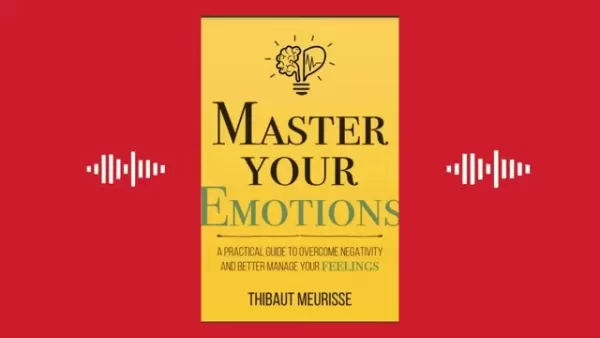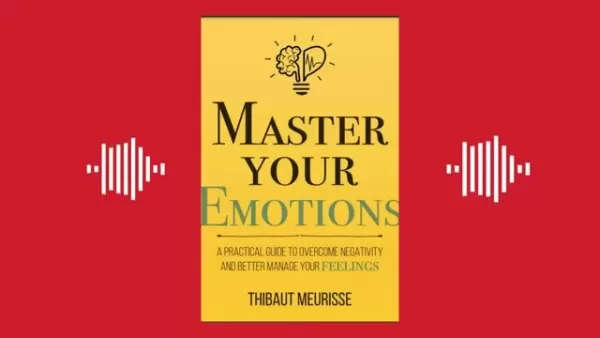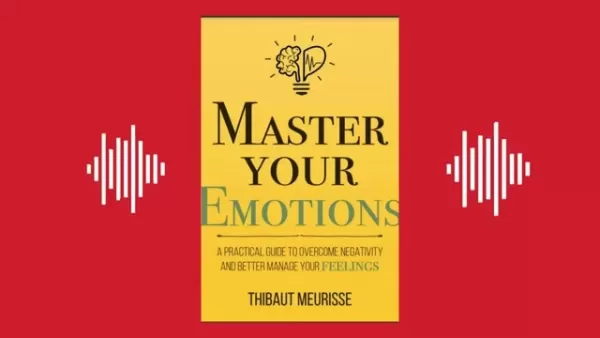Master Your Emotions: Practical Strategies for Managing Feelings

 May 2, 2025
May 2, 2025

 FredBrown
FredBrown

 4
4
Navigating the intricate world of emotions can feel like a daunting task. Many of us grapple with negative feelings, stress, and the challenge of staying positive. This guide, drawing inspiration from self-help resources, is designed to arm you with the tools and techniques needed to take control of your emotions, overcome negativity, and lead a more fulfilling life. By understanding and harnessing the power of your emotions, you can unlock your full potential and embrace a life filled with joy, resilience, and emotional wellness.
Key Points
- Emotions are neither good nor bad; they're a spectrum of experiences that provide valuable insights.
- Mastering emotions involves understanding their origins and how they shape our thoughts and actions.
- Techniques like mindfulness, meditation, and positive self-talk are effective in managing emotions.
- A healthy lifestyle, including enough sleep, exercise, and a balanced diet, is essential for emotional wellbeing.
- Building self-respect and addressing insecurities can weaken the ego's control over your emotions.
- Breathing exercises and changes in body language can have a significant impact on your emotional state.
- Challenging negative thoughts and reframing them with positive affirmations can lead to deep emotional transformation.
- Identifying and replacing harmful habits with positive behaviors is crucial for long-term emotional health.
Understanding the Foundation of Emotional Mastery
What Are Emotions and Why Do They Matter?
Emotions are complex psychological states that encompass subjective experiences, physiological responses, and behavioral expressions. They are an essential part of being human and play a crucial role in how we experience and interact with the world. Although often labeled as positive or negative, emotions exist on a continuum and each has a unique function. Understanding the nature and purpose of our emotions is the first step toward mastering them.
Understanding Emotions
Emotions offer us insights into our internal states and the world around us. They can alert us to danger, motivate us to pursue our goals, and strengthen our social bonds. For instance, fear can help us steer clear of risky situations, while joy can enhance our relationships. By learning to recognize and interpret our emotions, we gain valuable insights into our needs, values, and priorities.

The Importance of Emotional Management
While emotions can serve as useful guides, they can also become overwhelming and disruptive if not managed properly. Uncontrolled emotions like anger, anxiety, or sadness can lead to poor decision-making, strained relationships, and even physical health issues. The ability to effectively manage our emotions, known as emotional intelligence, is vital for navigating life's challenges, achieving personal and professional success, and maintaining overall wellbeing. Mastering your emotions allows you to respond to situations with greater clarity, resilience, and empathy.
The Role of the Brain and Survival Mechanisms
Our brain plays a pivotal role in shaping our emotional experiences. Survival mechanisms, honed over millennia, influence how we perceive and react to threats and opportunities. Understanding these mechanisms is key to mastering your emotions.
The Ancestral Connection
Our ancestors faced numerous challenges in their fight for survival. Their brains developed mechanisms to detect danger and ensure safety. These mechanisms, often referred to as the "fight-or-flight" response, trigger a series of physiological changes designed to help us confront or escape threats. Although these responses were crucial for survival in the past, they can sometimes be maladaptive in today's world.

The Negativity Bias
Due to our evolutionary history, our brains tend to exhibit a negativity bias, meaning we are more likely to focus on and remember negative experiences than positive ones. This bias helped our ancestors avoid danger, but it can also cause us to dwell on negative thoughts and feelings, leading to anxiety, stress, and depression. By recognizing and challenging these negative biases, we can reprogram our minds for more positive emotions.
The Dopamine Connection
The brain releases dopamine, a neurotransmitter associated with pleasure and reward, during activities like gambling, sex, eating delicious food, or exercising. While these activities can provide temporary happiness, addiction to them can lead to negative consequences. Therefore, finding healthy ways to increase dopamine levels is important for mastering your emotions.
Practical Steps to Mastering Your Emotional Landscape
Recognizing and Reprogramming Negative Thought Patterns
The first step toward emotional mastery is recognizing and understanding the negative thought patterns that fuel unwanted emotions. These patterns often operate on a subconscious level, shaping our perceptions and reactions without our conscious awareness. Here's a simple formula to help reprogram your mind for more positive emotions.
Common Negative Thought Patterns
- Catastrophizing: Imagining the worst possible outcome in any situation.
- Overgeneralization: Drawing broad conclusions based on a single event.
- Filtering: Focusing on the negative aspects of a situation while ignoring the positive ones.
- Personalization: Taking things personally and assuming responsibility for events beyond your control.
- Black-and-white thinking: Seeing things in extremes, without acknowledging the nuances in between.
Rewriting Your Internal Narrative
Once you identify your negative thought patterns, you can begin to challenge and reframe them. This involves questioning the validity of your thoughts and replacing them with more balanced and realistic perspectives. Consider these strategies:
- Challenge the evidence: Ask yourself if there is evidence to support your negative thoughts or if they are based on assumptions or fears.
- Consider alternative interpretations: Explore other possible explanations for the situation and challenge your initial negative assessment.
- Reframe the situation: Try to see the situation in a new light, focusing on potential benefits or opportunities for growth.
- Practice gratitude: Focus on the positive aspects of your life and express gratitude for what you have.
Implementing a Simple Formula for Positive Change
The article suggests a simple, yet effective formula to reprogram your mind toward positivity. This formula involves:
- Identifying negative emotions: Pinpoint the exact emotion that is affecting your mood and driving negativity.
- Acknowledging its triggers: Determine what thoughts, events, or scenarios are triggering your negative emotions.
- Challenging the validity and finding alternative ways: Question its source and replace it with rational and positive emotions.
- Replacing negativity with positivity: Find joy in the positive side to get back on track.
Managing Stress Through Practical Techniques
Stress is an inevitable part of modern life. Learning to manage stress effectively is crucial for maintaining emotional wellbeing. When you find yourself struggling with negative feelings or need help dealing with stress, the techniques outlined here will guide you through these challenging emotions effectively.
Technique Description Mindfulness Meditation Practicing mindfulness meditation allows you to focus on the present moment and observe your thoughts and feelings without judgment. This can help reduce anxiety and promote a sense of calm. Deep Breathing Deep breathing exercises can activate the parasympathetic nervous system, which promotes relaxation and reduces stress. Try inhaling deeply through your nose, holding your breath for a few seconds, and then exhaling slowly through your mouth. Progressive Relaxation This technique involves tensing and releasing different muscle groups in your body, promoting relaxation and reducing muscle tension. Physical Exercise Regular physical activity is a powerful stress reliever. Exercise releases endorphins, which have mood-boosting effects. Spending Time in Nature Studies have shown that spending time in nature can lower stress hormones and promote a sense of calm. Even a short walk in a park can make a difference. Engaging Hobbies Participating in enjoyable activities, such as reading, listening to music, painting, or gardening, can provide a welcome distraction from stress and promote a sense of wellbeing.
Creating a Daily Stress-Management Routine
Make stress management a part of your daily routine by incorporating these techniques into your life. Schedule time for relaxation, exercise, and enjoyable activities. Prioritize self-care and learn to say "no" to commitments that add unnecessary stress to your life.
Reshaping Your Life's Narrative for Emotional Control
We all have a story about ourselves—a narrative that shapes how we see ourselves and the world around us. By reshaping this narrative, we can gain greater control over our emotions. Here's how to reshape your life's narrative for better emotional control.
Examining Your Core Beliefs
Our core beliefs are fundamental assumptions about ourselves, others, and the world. These beliefs, often formed early in life, can have a profound impact on our emotions and behaviors. Challenging and modifying limiting core beliefs can lead to significant emotional transformation.
Practicing Self-Compassion
Self-compassion involves treating yourself with kindness, understanding, and acceptance, especially during difficult times. It means recognizing that everyone makes mistakes and experiences challenges, and that you are not alone in your struggles.

Focusing on Your Strengths
Instead of dwelling on your weaknesses, focus on your strengths and accomplishments. Recognize your unique talents and abilities, and celebrate your successes, no matter how small. Acknowledge your feelings and try to cope with them by harnessing your emotions positively.
How to Effectively Apply the Methods
Consistency is Key
The techniques described above require consistent effort and practice. To experience lasting change, commit to incorporating these methods into your daily life. Be patient with yourself and celebrate your progress along the way. Remember that emotional mastery is a journey, not a destination.
Tailoring Techniques to Your Needs
Not every technique will work for everyone. Experiment with different strategies and find what resonates with you. Adapt and modify the methods to fit your unique needs and preferences. Be open to trying new things and discovering what helps you manage your emotions most effectively.
Pricing
Master Your Emotions discusses general techniques and strategies, and does not involve any specific pricing or product purchase information.
Pros and Cons of Taking Control of Your Emotions
Pros
- Increased Self-Awareness
- Enhanced Resilience
- Improved Relationships
- Greater Personal Growth
Cons
- Potential for Suppression
- Risk of Emotional Detachment
- Over-Analysis
- Unrealistic Expectations
Core Features of a Positive Emotional State
Key Elements
- Self-awareness: Recognizing and understanding your emotions.
- Emotional regulation: Managing and modulating your emotions in healthy ways.
- Resilience: Bouncing back from adversity and setbacks.
- Empathy: Understanding and sharing the feelings of others.
- Optimism: Maintaining a positive outlook on life.
Real-Life Applications
Examples of Situations
- Workplace Stress: Managing conflict, dealing with difficult colleagues, and navigating high-pressure environments.
- Relationship Challenges: Communicating effectively, resolving conflict, and building stronger connections with loved ones.
- Personal Setbacks: Coping with loss, disappointment, and adversity.
- Improving Overall Wellbeing: Cultivating joy, gratitude, and a sense of purpose.
FAQ
What is emotional mastery?
Emotional mastery is the ability to understand, accept, and effectively manage your emotions. It involves developing self-awareness, emotional regulation skills, and the capacity to respond to situations with resilience and empathy.
Is it possible to eliminate negative emotions entirely?
No, it's not realistic or even desirable to eliminate negative emotions entirely. They are a natural part of the human experience. Emotional mastery is about learning to manage these emotions effectively, rather than trying to suppress or eliminate them.
How long does it take to master your emotions?
The journey to emotional mastery is an ongoing process that takes time and effort. There is no quick fix or magic bullet. Be patient with yourself and celebrate your progress along the way.
What if I struggle to implement these techniques on my own?
If you find it difficult to implement these techniques on your own, consider seeking professional help from a therapist or counselor. They can provide personalized guidance and support to help you develop emotional mastery.
Related Questions
How Can Mindfulness Meditation Help Master Your Emotions?
Mindfulness meditation is a powerful tool for enhancing emotional regulation and self-awareness. It enables us to observe our thoughts and emotions without judgment, fostering a non-reactive, accepting approach to our internal states. This technique is particularly beneficial for those seeking to master their emotions. By consistently engaging in mindfulness meditation, individuals can cultivate a heightened sense of presence and gain the capacity to navigate challenging emotional experiences with greater composure and balance.
How Can a Gratitude Journal Improve Emotional Wellbeing?
The regular practice of maintaining a gratitude journal can significantly uplift emotional wellbeing by shifting focus towards the positive aspects of one's life. By regularly acknowledging and recording these aspects in a gratitude journal, you can cultivate a more optimistic outlook and enhance your ability to appreciate the present. This, in turn, reduces the impact of negative emotions and enhances your emotional strength. For anyone trying to master your emotions, gratitude journaling is an essential and valuable tool.
What Role Does Self-Respect Play in Mastering Emotions?
Self-respect acts as a cornerstone in building emotional resilience and stability. When individuals hold themselves in high regard, they are better equipped to make choices that align with their values and emotional wellbeing. It provides a foundation for making choices that honor your emotional needs. Additionally, maintaining a sense of self-respect encourages healthier relationships, reducing vulnerability to emotional manipulation and fostering a stronger sense of personal boundaries. Building self-respect is essential for mastering your emotions and leading a fulfilling life.
How Does Body Language Affect Emotional State?
Our emotional states and body language are deeply intertwined. Studies have revealed that adopting certain postures or gestures can influence our emotions in a reciprocal manner. For instance, standing tall with an open chest conveys confidence, while slouching or crossing arms can signal insecurity or defensiveness. To enhance your emotional strength, consciously adjusting your body language to reflect positive emotions can be beneficial. Simply smiling, maintaining eye contact, or adopting a confident stance can create a positive feedback loop, influencing your emotional state and making you feel more empowered.
Related article
 Unpacking Doc McStuffins Lore: Nostalgia, Subtext & Show Secrets
Doc McStuffins, the charming Disney Junior series, might appear straightforward at first glance. Yet, beneath its vibrant theme song and endearing characters, there's a complex web of storylines, character growth, and surprisingly deep themes. From puzzling continuity errors to thoughtful portrayals
Unpacking Doc McStuffins Lore: Nostalgia, Subtext & Show Secrets
Doc McStuffins, the charming Disney Junior series, might appear straightforward at first glance. Yet, beneath its vibrant theme song and endearing characters, there's a complex web of storylines, character growth, and surprisingly deep themes. From puzzling continuity errors to thoughtful portrayals
 AI Travel Planners Revolutionize Trip Planning by 2025
In 2025, the travel industry is experiencing a revolutionary shift thanks to artificial intelligence (AI). Gone are the days of endless scrolling through travel blogs and reviews. Now, AI travel planners are changing the game, making trip planning easier, more personalized, and incredibly enjoyable.
AI Travel Planners Revolutionize Trip Planning by 2025
In 2025, the travel industry is experiencing a revolutionary shift thanks to artificial intelligence (AI). Gone are the days of endless scrolling through travel blogs and reviews. Now, AI travel planners are changing the game, making trip planning easier, more personalized, and incredibly enjoyable.
 Eminememerald's Houdini AI Cover: A Unique Blocky Rendition of a Classic
Get ready to dive into a musical experience that's truly one-of-a-kind! Eminememerald has just released an AI-generated cover of Eminem's latest track, "Houdini," and it's making waves across the internet. This isn't your typical cover; it's a brilliant fusion of Eminem's iconic rap style with a pla
Comments (0)
0/200
Eminememerald's Houdini AI Cover: A Unique Blocky Rendition of a Classic
Get ready to dive into a musical experience that's truly one-of-a-kind! Eminememerald has just released an AI-generated cover of Eminem's latest track, "Houdini," and it's making waves across the internet. This isn't your typical cover; it's a brilliant fusion of Eminem's iconic rap style with a pla
Comments (0)
0/200

 May 2, 2025
May 2, 2025

 FredBrown
FredBrown

 4
4
Navigating the intricate world of emotions can feel like a daunting task. Many of us grapple with negative feelings, stress, and the challenge of staying positive. This guide, drawing inspiration from self-help resources, is designed to arm you with the tools and techniques needed to take control of your emotions, overcome negativity, and lead a more fulfilling life. By understanding and harnessing the power of your emotions, you can unlock your full potential and embrace a life filled with joy, resilience, and emotional wellness.
Key Points
- Emotions are neither good nor bad; they're a spectrum of experiences that provide valuable insights.
- Mastering emotions involves understanding their origins and how they shape our thoughts and actions.
- Techniques like mindfulness, meditation, and positive self-talk are effective in managing emotions.
- A healthy lifestyle, including enough sleep, exercise, and a balanced diet, is essential for emotional wellbeing.
- Building self-respect and addressing insecurities can weaken the ego's control over your emotions.
- Breathing exercises and changes in body language can have a significant impact on your emotional state.
- Challenging negative thoughts and reframing them with positive affirmations can lead to deep emotional transformation.
- Identifying and replacing harmful habits with positive behaviors is crucial for long-term emotional health.
Understanding the Foundation of Emotional Mastery
What Are Emotions and Why Do They Matter?
Emotions are complex psychological states that encompass subjective experiences, physiological responses, and behavioral expressions. They are an essential part of being human and play a crucial role in how we experience and interact with the world. Although often labeled as positive or negative, emotions exist on a continuum and each has a unique function. Understanding the nature and purpose of our emotions is the first step toward mastering them.
Understanding Emotions
Emotions offer us insights into our internal states and the world around us. They can alert us to danger, motivate us to pursue our goals, and strengthen our social bonds. For instance, fear can help us steer clear of risky situations, while joy can enhance our relationships. By learning to recognize and interpret our emotions, we gain valuable insights into our needs, values, and priorities.

The Importance of Emotional Management
While emotions can serve as useful guides, they can also become overwhelming and disruptive if not managed properly. Uncontrolled emotions like anger, anxiety, or sadness can lead to poor decision-making, strained relationships, and even physical health issues. The ability to effectively manage our emotions, known as emotional intelligence, is vital for navigating life's challenges, achieving personal and professional success, and maintaining overall wellbeing. Mastering your emotions allows you to respond to situations with greater clarity, resilience, and empathy.
The Role of the Brain and Survival Mechanisms
Our brain plays a pivotal role in shaping our emotional experiences. Survival mechanisms, honed over millennia, influence how we perceive and react to threats and opportunities. Understanding these mechanisms is key to mastering your emotions.
The Ancestral Connection
Our ancestors faced numerous challenges in their fight for survival. Their brains developed mechanisms to detect danger and ensure safety. These mechanisms, often referred to as the "fight-or-flight" response, trigger a series of physiological changes designed to help us confront or escape threats. Although these responses were crucial for survival in the past, they can sometimes be maladaptive in today's world.

The Negativity Bias
Due to our evolutionary history, our brains tend to exhibit a negativity bias, meaning we are more likely to focus on and remember negative experiences than positive ones. This bias helped our ancestors avoid danger, but it can also cause us to dwell on negative thoughts and feelings, leading to anxiety, stress, and depression. By recognizing and challenging these negative biases, we can reprogram our minds for more positive emotions.
The Dopamine Connection
The brain releases dopamine, a neurotransmitter associated with pleasure and reward, during activities like gambling, sex, eating delicious food, or exercising. While these activities can provide temporary happiness, addiction to them can lead to negative consequences. Therefore, finding healthy ways to increase dopamine levels is important for mastering your emotions.
Practical Steps to Mastering Your Emotional Landscape
Recognizing and Reprogramming Negative Thought Patterns
The first step toward emotional mastery is recognizing and understanding the negative thought patterns that fuel unwanted emotions. These patterns often operate on a subconscious level, shaping our perceptions and reactions without our conscious awareness. Here's a simple formula to help reprogram your mind for more positive emotions.
Common Negative Thought Patterns
- Catastrophizing: Imagining the worst possible outcome in any situation.
- Overgeneralization: Drawing broad conclusions based on a single event.
- Filtering: Focusing on the negative aspects of a situation while ignoring the positive ones.
- Personalization: Taking things personally and assuming responsibility for events beyond your control.
- Black-and-white thinking: Seeing things in extremes, without acknowledging the nuances in between.
Rewriting Your Internal Narrative
Once you identify your negative thought patterns, you can begin to challenge and reframe them. This involves questioning the validity of your thoughts and replacing them with more balanced and realistic perspectives. Consider these strategies:
- Challenge the evidence: Ask yourself if there is evidence to support your negative thoughts or if they are based on assumptions or fears.
- Consider alternative interpretations: Explore other possible explanations for the situation and challenge your initial negative assessment.
- Reframe the situation: Try to see the situation in a new light, focusing on potential benefits or opportunities for growth.
- Practice gratitude: Focus on the positive aspects of your life and express gratitude for what you have.
Implementing a Simple Formula for Positive Change
The article suggests a simple, yet effective formula to reprogram your mind toward positivity. This formula involves:
- Identifying negative emotions: Pinpoint the exact emotion that is affecting your mood and driving negativity.
- Acknowledging its triggers: Determine what thoughts, events, or scenarios are triggering your negative emotions.
- Challenging the validity and finding alternative ways: Question its source and replace it with rational and positive emotions.
- Replacing negativity with positivity: Find joy in the positive side to get back on track.
Managing Stress Through Practical Techniques
Stress is an inevitable part of modern life. Learning to manage stress effectively is crucial for maintaining emotional wellbeing. When you find yourself struggling with negative feelings or need help dealing with stress, the techniques outlined here will guide you through these challenging emotions effectively.
| Technique | Description |
|---|---|
| Mindfulness Meditation | Practicing mindfulness meditation allows you to focus on the present moment and observe your thoughts and feelings without judgment. This can help reduce anxiety and promote a sense of calm. |
| Deep Breathing | Deep breathing exercises can activate the parasympathetic nervous system, which promotes relaxation and reduces stress. Try inhaling deeply through your nose, holding your breath for a few seconds, and then exhaling slowly through your mouth. |
| Progressive Relaxation | This technique involves tensing and releasing different muscle groups in your body, promoting relaxation and reducing muscle tension. |
| Physical Exercise | Regular physical activity is a powerful stress reliever. Exercise releases endorphins, which have mood-boosting effects. |
| Spending Time in Nature | Studies have shown that spending time in nature can lower stress hormones and promote a sense of calm. Even a short walk in a park can make a difference. |
| Engaging Hobbies | Participating in enjoyable activities, such as reading, listening to music, painting, or gardening, can provide a welcome distraction from stress and promote a sense of wellbeing. |
Creating a Daily Stress-Management Routine
Make stress management a part of your daily routine by incorporating these techniques into your life. Schedule time for relaxation, exercise, and enjoyable activities. Prioritize self-care and learn to say "no" to commitments that add unnecessary stress to your life.
Reshaping Your Life's Narrative for Emotional Control
We all have a story about ourselves—a narrative that shapes how we see ourselves and the world around us. By reshaping this narrative, we can gain greater control over our emotions. Here's how to reshape your life's narrative for better emotional control.
Examining Your Core Beliefs
Our core beliefs are fundamental assumptions about ourselves, others, and the world. These beliefs, often formed early in life, can have a profound impact on our emotions and behaviors. Challenging and modifying limiting core beliefs can lead to significant emotional transformation.
Practicing Self-Compassion
Self-compassion involves treating yourself with kindness, understanding, and acceptance, especially during difficult times. It means recognizing that everyone makes mistakes and experiences challenges, and that you are not alone in your struggles.

Focusing on Your Strengths
Instead of dwelling on your weaknesses, focus on your strengths and accomplishments. Recognize your unique talents and abilities, and celebrate your successes, no matter how small. Acknowledge your feelings and try to cope with them by harnessing your emotions positively.
How to Effectively Apply the Methods
Consistency is Key
The techniques described above require consistent effort and practice. To experience lasting change, commit to incorporating these methods into your daily life. Be patient with yourself and celebrate your progress along the way. Remember that emotional mastery is a journey, not a destination.
Tailoring Techniques to Your Needs
Not every technique will work for everyone. Experiment with different strategies and find what resonates with you. Adapt and modify the methods to fit your unique needs and preferences. Be open to trying new things and discovering what helps you manage your emotions most effectively.
Pricing
Master Your Emotions discusses general techniques and strategies, and does not involve any specific pricing or product purchase information.
Pros and Cons of Taking Control of Your Emotions
Pros
- Increased Self-Awareness
- Enhanced Resilience
- Improved Relationships
- Greater Personal Growth
Cons
- Potential for Suppression
- Risk of Emotional Detachment
- Over-Analysis
- Unrealistic Expectations
Core Features of a Positive Emotional State
Key Elements
- Self-awareness: Recognizing and understanding your emotions.
- Emotional regulation: Managing and modulating your emotions in healthy ways.
- Resilience: Bouncing back from adversity and setbacks.
- Empathy: Understanding and sharing the feelings of others.
- Optimism: Maintaining a positive outlook on life.
Real-Life Applications
Examples of Situations
- Workplace Stress: Managing conflict, dealing with difficult colleagues, and navigating high-pressure environments.
- Relationship Challenges: Communicating effectively, resolving conflict, and building stronger connections with loved ones.
- Personal Setbacks: Coping with loss, disappointment, and adversity.
- Improving Overall Wellbeing: Cultivating joy, gratitude, and a sense of purpose.
FAQ
What is emotional mastery?
Emotional mastery is the ability to understand, accept, and effectively manage your emotions. It involves developing self-awareness, emotional regulation skills, and the capacity to respond to situations with resilience and empathy.
Is it possible to eliminate negative emotions entirely?
No, it's not realistic or even desirable to eliminate negative emotions entirely. They are a natural part of the human experience. Emotional mastery is about learning to manage these emotions effectively, rather than trying to suppress or eliminate them.
How long does it take to master your emotions?
The journey to emotional mastery is an ongoing process that takes time and effort. There is no quick fix or magic bullet. Be patient with yourself and celebrate your progress along the way.
What if I struggle to implement these techniques on my own?
If you find it difficult to implement these techniques on your own, consider seeking professional help from a therapist or counselor. They can provide personalized guidance and support to help you develop emotional mastery.
Related Questions
How Can Mindfulness Meditation Help Master Your Emotions?
Mindfulness meditation is a powerful tool for enhancing emotional regulation and self-awareness. It enables us to observe our thoughts and emotions without judgment, fostering a non-reactive, accepting approach to our internal states. This technique is particularly beneficial for those seeking to master their emotions. By consistently engaging in mindfulness meditation, individuals can cultivate a heightened sense of presence and gain the capacity to navigate challenging emotional experiences with greater composure and balance.
How Can a Gratitude Journal Improve Emotional Wellbeing?
The regular practice of maintaining a gratitude journal can significantly uplift emotional wellbeing by shifting focus towards the positive aspects of one's life. By regularly acknowledging and recording these aspects in a gratitude journal, you can cultivate a more optimistic outlook and enhance your ability to appreciate the present. This, in turn, reduces the impact of negative emotions and enhances your emotional strength. For anyone trying to master your emotions, gratitude journaling is an essential and valuable tool.
What Role Does Self-Respect Play in Mastering Emotions?
Self-respect acts as a cornerstone in building emotional resilience and stability. When individuals hold themselves in high regard, they are better equipped to make choices that align with their values and emotional wellbeing. It provides a foundation for making choices that honor your emotional needs. Additionally, maintaining a sense of self-respect encourages healthier relationships, reducing vulnerability to emotional manipulation and fostering a stronger sense of personal boundaries. Building self-respect is essential for mastering your emotions and leading a fulfilling life.
How Does Body Language Affect Emotional State?
Our emotional states and body language are deeply intertwined. Studies have revealed that adopting certain postures or gestures can influence our emotions in a reciprocal manner. For instance, standing tall with an open chest conveys confidence, while slouching or crossing arms can signal insecurity or defensiveness. To enhance your emotional strength, consciously adjusting your body language to reflect positive emotions can be beneficial. Simply smiling, maintaining eye contact, or adopting a confident stance can create a positive feedback loop, influencing your emotional state and making you feel more empowered.
 Unpacking Doc McStuffins Lore: Nostalgia, Subtext & Show Secrets
Doc McStuffins, the charming Disney Junior series, might appear straightforward at first glance. Yet, beneath its vibrant theme song and endearing characters, there's a complex web of storylines, character growth, and surprisingly deep themes. From puzzling continuity errors to thoughtful portrayals
Unpacking Doc McStuffins Lore: Nostalgia, Subtext & Show Secrets
Doc McStuffins, the charming Disney Junior series, might appear straightforward at first glance. Yet, beneath its vibrant theme song and endearing characters, there's a complex web of storylines, character growth, and surprisingly deep themes. From puzzling continuity errors to thoughtful portrayals
 AI Travel Planners Revolutionize Trip Planning by 2025
In 2025, the travel industry is experiencing a revolutionary shift thanks to artificial intelligence (AI). Gone are the days of endless scrolling through travel blogs and reviews. Now, AI travel planners are changing the game, making trip planning easier, more personalized, and incredibly enjoyable.
AI Travel Planners Revolutionize Trip Planning by 2025
In 2025, the travel industry is experiencing a revolutionary shift thanks to artificial intelligence (AI). Gone are the days of endless scrolling through travel blogs and reviews. Now, AI travel planners are changing the game, making trip planning easier, more personalized, and incredibly enjoyable.
 Eminememerald's Houdini AI Cover: A Unique Blocky Rendition of a Classic
Get ready to dive into a musical experience that's truly one-of-a-kind! Eminememerald has just released an AI-generated cover of Eminem's latest track, "Houdini," and it's making waves across the internet. This isn't your typical cover; it's a brilliant fusion of Eminem's iconic rap style with a pla
Eminememerald's Houdini AI Cover: A Unique Blocky Rendition of a Classic
Get ready to dive into a musical experience that's truly one-of-a-kind! Eminememerald has just released an AI-generated cover of Eminem's latest track, "Houdini," and it's making waves across the internet. This isn't your typical cover; it's a brilliant fusion of Eminem's iconic rap style with a pla
































